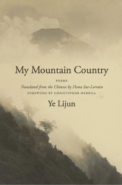
Review: My Mountain Country, Poems by Ye Lijun
Review by Tim Lantz
My Mountain Country
Poems by Ye Lijun, translated by Fiona Sze-Lorrain
World Poetry Books, August 2019
$16.00, 208 pp.
ISBN: 978-0-9992613-4-7
My Mountain Country, Ye Lijun’s English debut, is a collection of poems from her three books. The speaker of these poems packs into her life a rare, thick solitude—not as a romantic ideal, but as a place from which to regard her relationship to the countryside of Zhejiang, China. In “Lotus Summit Diary,” she says, “I no longer // seem to lack anything, what do I still lack / Wind pours in from the slope.”
Although Ye’s syntax implies end-stopping, light punctuation makes lines appear enjambed, the borders between images only temporary arrangements, as in “In Search of Porcelain”:
……….Before fondling you, I grew
……….intimate with the cold jade glow and the stream
……….Slick pebbles by the water, a drip
……….of crisp, sonorous bird call
……….You never confine yourself to what you are
So rare are periods that, when one does show up, instead of delimiting a sentence, it becomes porous, letting meaning percolate through to the next sentence. The result is loose definition through temporal juxtaposition—for example, “secretly I had learned to swim / the clumsy dog paddle. This was my childhood, a day in June” (“First Encounter”).
Rather than arrange these poems chronologically, Ye and the translator, Fiona Sze-Lorrain, have sequenced them into a narrative arc linking biography and ecology. “I / am poor, own no more than any plant does // no more than even a strand of grass” (“Sitting and Waiting for Daybreak”). The sunlight shines on the mountain where the speaker lives as well as “on me, this other / patch of moisture” (“Going Out”). “Along my thighs, as the afternoon goes by / it slowly climbs onto my belly” (“Naked Spring”).
Sze-Lorrain, as always, meets translation’s dual, and sometimes dueling, demands: meaning and style. Her care and skill make these poems feel as if they began in English. Consider the final two stanzas of “In the Study Late at Night”:
……….No, there won’t be a next life… More than once, I stare
……….into your eyes. Where are you?
……….God is the sea, the billows, the ebb and flow
……….I recite, alone
……….at the desk, a pot of clivia years from flowering
……….yearning for life, but not waiting for a miracle
In that last line, the Chinese phrase kewang shenghuo might have steered a different translator toward thirsting for life, yet Sze-Lorrain’s ears and eyes are better—we get not only the consonance but also the visual rhyme of years and yearning. Surprising moments like this fill her translations and reward our rereading.
My Mountain Country is one of those rare books that whispers into life many roaring thoughts. This collection proves Ye Lijun’s importance to readers outside China and reconfirms Fiona Sze-Lorrain’s talent.
Tim Lantz writes about world Englishes and literature of the Chinese diaspora. His website is timlantz.com.


Leave a Reply